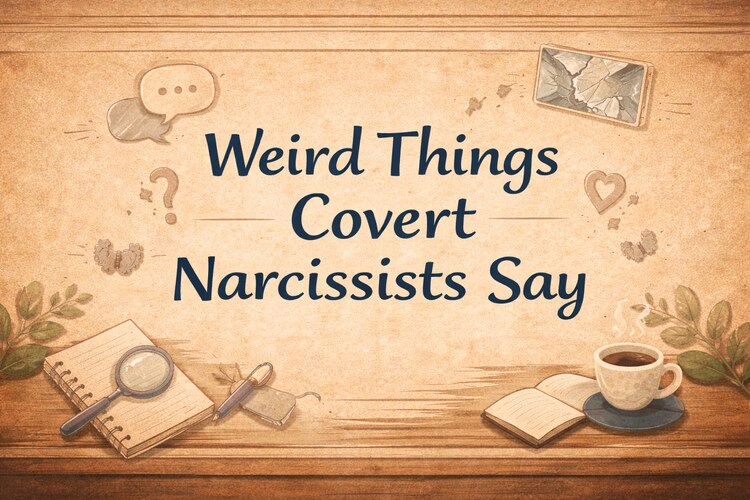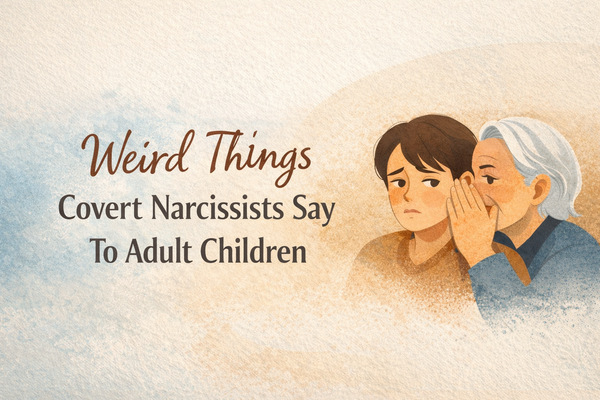“Hate is the complement of fear and narcissists like being feared. It imbues them with an intoxicating sensation of omnipotence.”
~ SAM VAKNIN
Narcissists have a two-edged sword of power and manipulation, which enables them to control other people. But do you know what’s more concerning than this?
People don’t realize covert narcissists who appear introverted can also be toxic control freaks. Let’s learn more about the things covert narcissists do to control you.
- Who Are Covert Narcissists?
- Relationship With Covert Narcissists
- 10 Creepy Things Covert Narcissists Say to Control You
- Healing From Covert Narcissistic Abuse
Who Are Covert Narcissists?
It has long been discussed among the theorists of mental health that narcissism is a spectrum, but the various shades of the narcissism spectrum are still being researched. Covert Narcissists are one of the major forms of vulnerable narcissism however, we always thought of narcissists as boastful personalities who are expressively all about themselves.
Our initial thoughts about narcissism and narcissists aren’t that wrong because in psychology, the personality dynamics of narcissistic personalities include dramatic reactions and strong displays of emotions. Surprisingly, the Diagnostic Manual of Mental Disorders (DSM) categorizes narcissistic personalities as lethal as antisocial, histrionic, and borderline personalities. [1]
Now, you may wonder which side of narcissistic individuals is vulnerable? It is the covert display of narcissistic behaviors, in which the person may appear shy and introverted, but covert narcissists are highly manipulative individuals. Their self-centeredness is displayed via being reserved and cynical about everything. Covert narcissists are selfish and lack empathy for others, but their facade will show you a deeply caring and modest personality.
One of the vindictive traits of covert narcissists is their need for control. They subtly control the lives of others, which often goes unnoticed by their family, partners, friends, and colleagues. Their unsolicited control keeps on stinging until you learn that it is a form of narcissistic abuse.
Relationship With Covert Narcissists
Depending on your partner for love and care is the part and parcel of every relationship. But unfortunately sharing a relationship with covert narcissists could take a serious toll on your mental health. The manipulation, control, mood fluctuations, and bias in the way they treat you often make you question your decision to choose them.
The things covert narcissists do in relationships to control their loved ones are often mistaken for possessiveness or love. Covert narcissists, in some cases, love-bomb their partners with excessive love and gifts. This turns their partner blind to the fact that love can also be used for abusive control. Covert narcissists unconsciously push themselves to be the center of everything. Moreover, covert narcissists make their partners walk on eggshells; taking decisions or expressing oneself around them will result in a low mood or cold shoulders. It may sound easy to spot covert narcissists’ control traps, but it is tiring to hold them accountable or exit their toxic control saga.
We believe in empowering you to identify the communication styles they use and things covert narcissists do to control you.
10 Creepy Things Covert Narcissists Say to Control You
Covert narcissists may appear vulnerable, but the creepy stuff they say to exert control in day-to-day conversations will surely be a surprise for you.
Let’s dig into how covert narcissists say creepy things that act as slow poison in your life.
1. “I think I’ll never be enough for you.”
Whenever you try to get their attention over some areas of improvement, they will get finicky about everything. Covert narcissists themselves lack giving regard, but they claim to be underappreciated. You’ll hear them saying “nobody values me”, “why was I born”?. In relationships, covert narcissists guilt-trip you by saying, “I think you deserve better”. It is futile to expect emotional feedback from them, because they manipulate you to think it’s them who deserves emotional attention.
2. “Tell me the last time I’ve said this?”
One of the things covert narcissists do to control you is gaslighting. They will make you question your thoughts and memories by asking when this happened. Covert narcissists force others to provide proof like screenshots of the conversation or the time they said something. It’s a trick to make someone feel guilty, as if they are making false claims or lying about the things covert narcissists say.
3. “You are blessed to have me.”
Covert narcissists are control freaks, but due to their introverted nature, they subliminally play with your mind. Covert narcissists as parents or partners want their loved ones to feel indebted to their favors. Covert narcissists have an insecure self-image, which makes them easily jealous if their loved ones or colleagues are surpassing them. Covert narcissists will manipulate you into thinking that they had other options, but they’ve chosen you.
4. “Puff! You give up easily.”
Covert narcissists share a traumatic childhood history. Their emotionally unable parents make them cut off emotions and feelings. While covert narcissists think expressing vulnerability is a sign of weakness, they shame you for being sensitive. It is one of their tactics to numb your feelings so that you may fear expressing yourself.
5. “You made me react to it”
You made me do it is their go-to phrase in arguments. Covert narcissists use projection to blame everything on others while claiming themselves to be innocent. They don’t take personal regard for the negative things covert narcissists do, but will always take credit for the positive happenings.
6. “All’s well that ends well”
Covert narcissists love to devalue your stance, they will rush the conversation towards an end by pushing you to ‘look at the bigger picture’ and ‘focus on the good part’. This way, covert narcissists control the way you react, because when you invest in proving yourself, they consider it as adding to the negativity.
7. “Sorry that makes no sense, be practical.”
The phrases covert narcissists use revolve around making you feel that you lack logic. Covert narcissists portray themselves as the only person with logic and practical knowledge in the room. They will undermine your statements for being too emotional while emphasizing their logical points. Covert narcissists also have a superiority complex, but they outsmart you by hiding it under shyness. Covert narcissists exert their control in a way that people believe only they can offer sane advice.
8. “Maybe, if I had parents like yours.”
Covert narcissists guilt-trip others by appearing vulnerable for having bad parenting or toxic partners. They often say ‘if I had different parents’ or ‘if I had a better partner, it would turn out to be good.’ whereas it’s them who are toxic and abusive to others. These attention-seeking phrases are used by covert narcissists to make others ignore their negativity and offer them sympathy for life being unfair to them.
9. “Who asked?”
Covert narcissists control the means of power, they rule others by deliberately forcing their opinions and decisions. Whenever someone tries to raise their voice against them, covert narcissists disregard them by saying nobody wants their opinion. Covert narcissists in authority figures treat others as if what they say doesn’t matter, and they can’t make covert narcissists reflect on their actions or words.
10. “Talk to me when you get over this.”
When covert narcissists feel threatened that you may expose them, they will start stonewalling. They cut the conversation midway to exit taking responsibility for their personal conduct. You’ll hear them saying ‘I don’t have time for this’ whenever it is about your feelings. Covert narcissists may display this as boundaries or leaving the conversation for good, but it is the silent treatment and cold shoulder that hurts the self-esteem of their loved ones. Partners who are eager to sort things out immediately rush to them, which further makes them control this cycle of abuse.
Healing From Covert Narcissistic Abuse
1. Command on Verbal and Nonverbal Communication
Focus on your gestures and posture while interacting with covert narcissists, some of the tricks are:
Maintaining eye contact with them, so they know you are speaking with certainty. Straight-up confident posture and to-the-point talks.
Switch from “You” to “I” statements. Connect dots, and speak about how they made you feel.
2. Practice Assertive Style Communication
You can practice the following statements to respond to the things covert narcissists say in an argument to control you;
“There’s nothing wrong with my memory, I remember the details.”
“I can share screenshots, messages, or emails about what I precisely want to discuss.”
“I am not being treated right, I deserve better than this.”
“Be respectful to my stances, otherwise I’ll react in the same manner.”
“I appreciate honesty.”
“We are mutually suffering due to this argument.”
“Don’t dictate my feelings, I know what to feel.”
3. Seek Professional and Social Support
You never know how numb covert narcissists control traps turn you. Sometimes you don’t believe it is happening but you become just like them. Seek social and professional support to keep your sanity in check and validate positive feelings.
Further exploring things covert narcissists say to control you helps with identifying covert narcissists in other spheres of life.
If you want to know more about Covert Narcissists, then click here!
Zainab Jafferi is a mental health activist with a Master’s in Clinical Psychology. Being a laureate of Content Writing, she holds double Gold Medals for content writing and content creation, awarded by the University of Karachi for “Outstanding Performance in Co-Curricular Activities” in the years 2020 and 2021. She writes on mental health issues faced by our youth.
- Zainab Jafferihttps://www.youthtabletalk.com/author/zainab-jafferi/
- Zainab Jafferihttps://www.youthtabletalk.com/author/zainab-jafferi/
- Zainab Jafferihttps://www.youthtabletalk.com/author/zainab-jafferi/
- Zainab Jafferihttps://www.youthtabletalk.com/author/zainab-jafferi/






